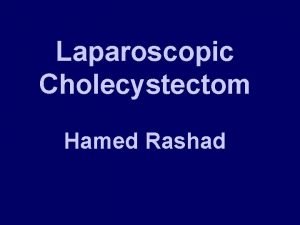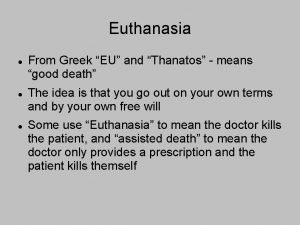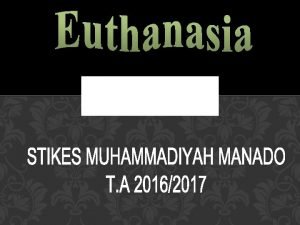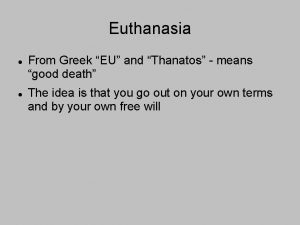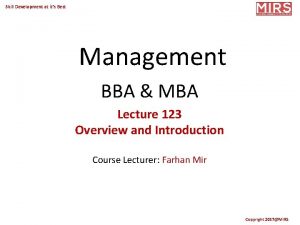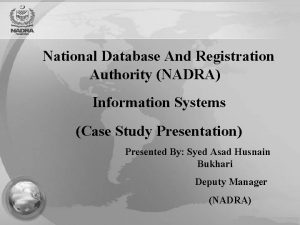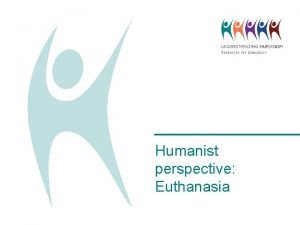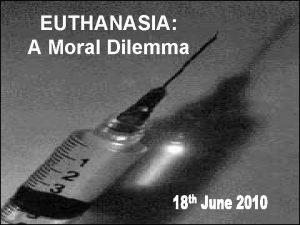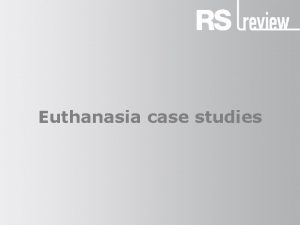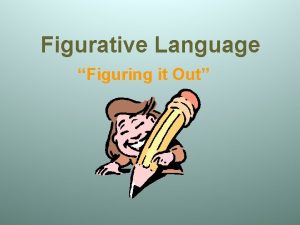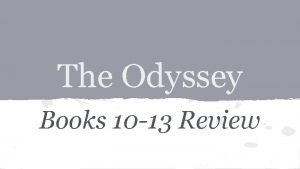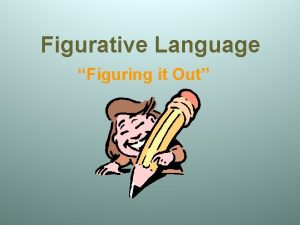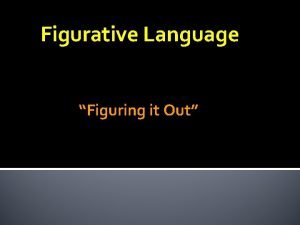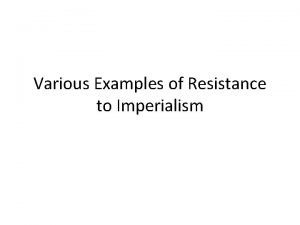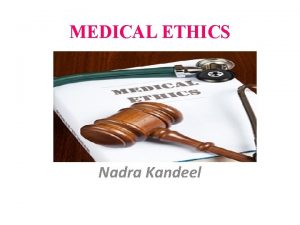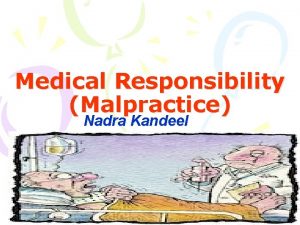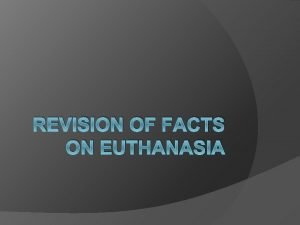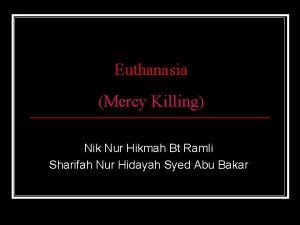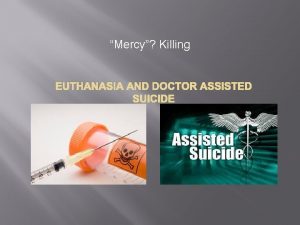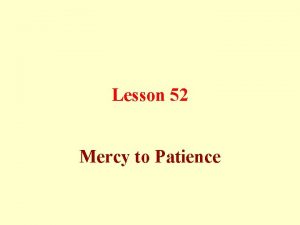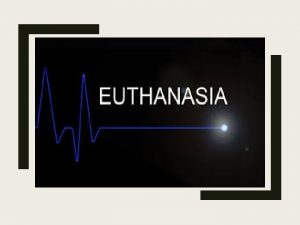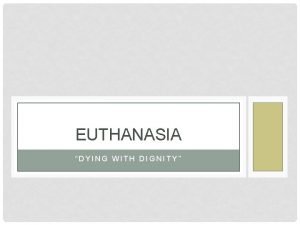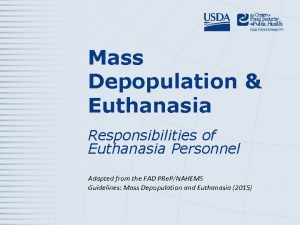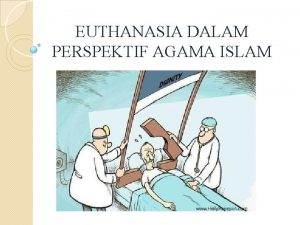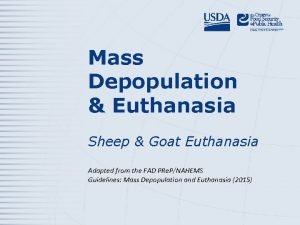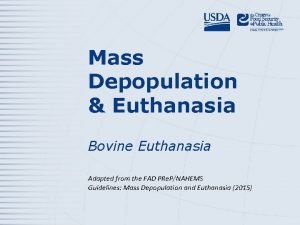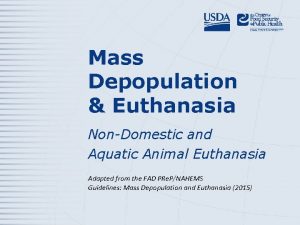Mercy Killing Nadra Kandeel What is Euthanasia Greek




























- Slides: 28


Mercy Killing Nadra Kandeel

What is Euthanasia? ® Greek eu = well or good, and Thanatos = death. ® Merciful killing, painless and gentle death. ® ﻗﺘﻞ ﺍﻟﺮﺣﻤﺔ ® Euthanasia is the deliberate killing of a person with terminal illness for the benefit of that person.

Moral questions? ® Did you have the right to end the life of terminally ill patient? ® If it is okay, under what circumstances is it right ® Is there any moral difference between killing someone and letting them die? ® Other countries: The Netherlands, Belgium (2002), Luxembourg (2008), Switzerland (assisted suicide only), assisted suicide only on some US states, Germany (assisted suicide).

Forms of euthanasia Active euthanasia Passive euthanasia Withdrawing ttt Withholding ttt

® Active euthanasia is when death is brought about by an act - for example when a person is killed by being given an overdose of pain-killers. ® Passive euthanasia is when death is brought about by an omission - i. e. when someone lets the person die. This can be by: 1 - Withdrawing treatment: for example, switching off a machine that is keeping a person alive so that they die of their disease. 2 - Withholding treatment: for example, not carrying out surgery that will extend life for a short time.

Patient request Voluntary ® Involuntary Non voluntary euthanasia occurs when the person who dies chooses life and is killed anyway. This is usually called murder

® Indirect euthanasia This means providing treatment (usually to reduce pain) that has the side effect of speeding the patient's death. ® Since the primary intention is not to kill, this is seen by some people (but not all) as morally acceptable. ® ® ® Assisted suicide Someone provides an individual with the information, guidance, and means to take his or her own life with the intention that they will be used for this purpose. When it is a doctor who helps another person to kill themselves it is called "physician assisted suicide. " ® It may be something as simple as getting drugs for the person and putting those drugs within their reach.

® The moral difference between killing and letting die ® Many people make a moral distinction between active and passive euthanasia. ® They think that it is acceptable to withhold treatment and allow a patient to die, but that it is never acceptable to kill a patient by a deliberate act. ® In active euthanasia the doctor takes an action with the intention that it will cause the patient's death, in passive euthanasia the doctor lets the patient die with the intention that it will cause the patient's death, so there is no real difference between passive and active euthanasia.

DNR - Do Not Resuscitate ® ® 1. 2. 3. DNRs are Do Not Resuscitate orders. A DNR order on a patient's file means that a doctor is not required to resuscitate a patient if their heart stops and is designed to prevent unnecessary suffering. The usual circumstances in which it is appropriate not to resuscitate are: when it will not restart the heart or breathing. when there is no benefit to the patient. when the benefits are outweighed by the burdens.

Arguments in favor of euthanasia Happens anyway Medical resources Right to die

Arguments in favour of euthanasia ® Euthanasia happens anyway "if we don't make abortion legal so that people can have it done in hospital, people will die from backstreet abortions".

® Medical resources Euthanasia may be necessary for the fair distribution of health resources. ® some people who are ill and could be cured are not able to get speedy access to the facilities they need for treatment. ® At the same time health resources are being used on people who cannot be cured, and who, for their own reasons, would prefer not to continue living.

® The right to die ® Many people think that each person has the right to control his or her body and life and so should be able to determine at what time, in what way and by whose hand he or she will die.

Arguments against euthanasia ® Religious ® Ethical arguments ® Practical arguments

Arguments against euthanasia The Against the will value of of God sufferin g Against best interests Difficult Regulation Other’ s right

® Against the will of God ® Euthanasia is against the word and will of God To kill oneself, or to get someone else to do it for us, is to deny God, and to deny God's rights over our lives and his right to choose the length of our lives and the way our lives end.

® The value of suffering It isn't easy to define suffering - most of us can decide when we are suffering but what is suffering for one person may not be suffering for another. Some people think that suffering is just one of the tests that God sets for human beings, and that the way we react to it shows the sort of person we are, and how deep our faith and trust in God is. Suffering is something which draws upon all the resources of a human being and enables them to reach the highest and noblest points of what they really are.

® Against ® ® ® best interests Euthanasia may not be in the best interests of the patient: The diagnosis may be wrong and the patient is not terminally ill The prognosis may be wrong and the patient is not going to die soon The patient is getting bad medical care and their suffering could be relieved by other means The patient requests euthanasia because of a passing phase of their disease, but is likely to feel much better in a while

® Other people have rights too ® Euthanasia is usually viewed from the viewpoint of the person who wants to die, but it affects other people too, and their rights should be considered. ® family and friends ® medical and other careers ® We should also balance our individual right to die against any bad consequences that it might have for the community in general. such as making involuntary euthanasia easier and so putting vulnerable people at risk.

Regulation of euthanasia ® It's not possible to regulate euthanasia ® Euthanasia opponents don't believe that it is possible to draft laws and guidelines that will prevent the abuse of euthanasia.

® Devalues some lives ® Some people fear that allowing euthanasia sends the message, "it's better to be dead than sick or disabled". ® Some societies have regarded people with disabilities as inferior, or as a burden on society and should be prevented from having children or even eliminated.

® Doctors and power ® It gives doctors too much power ® Some doctors have been shown to take these decisions improperly, defying the guidelines ® Do Not Resuscitate orders are more commonly used for older people and, in the United States, for black people, alcohol misusers, non-English speakers, and people infected with Human Immunodeficiency Virus. This suggests that doctors have stereotypes of who is not worth saving.

® Proper palliative care makes euthanasia unnecessary ® Palliative care is physical, emotional and spiritual care for a dying person when cure is not possible. It includes compassion and support for family and friends.

The Oregon approach ® The US state of Oregon legalised physician assisted suicide in 1998. During the first three years only around 2 people a month used this to end their lives. This was partly because of the severe conditions that had to be satisfied before a request for euthanasia could be granted: ® 1. patient must be resident in Oregon ® 2. patient must be aged over 18 ® 3. patient must make 2 oral and 1 written request for euthanasia ® 4. there must be at least 15 days between the first and the last request

® 5. patient must be terminally ill with a life expectancy of less than 6 months ® 6. this prognosis must be confirmed by a second consultant physician ® 7. both doctors must confirm that the patient is capable of making this decision ® 8. both doctors must confirm that the patient does not have medical condition that impairs their judgement ® 9. patient must self-administer the lethal medication


 Kandeel gall en gall
Kandeel gall en gall What is mercy killing
What is mercy killing Thanatos illness artinya
Thanatos illness artinya Kata euthanasia berasal dari bahasa
Kata euthanasia berasal dari bahasa Greek word for euthanasia
Greek word for euthanasia The word euthanasia is of greek origin
The word euthanasia is of greek origin Eu thanatos
Eu thanatos Nadra moulayes
Nadra moulayes Nadra swift registration centre
Nadra swift registration centre Nadra data and fingerprint acquisition form
Nadra data and fingerprint acquisition form Uethanasia
Uethanasia Euthanasia adalah
Euthanasia adalah Humanist views on euthanasia
Humanist views on euthanasia Euthanasia outline
Euthanasia outline Euthanasia case studies
Euthanasia case studies The greek miracle
The greek miracle Un definition of genocide
Un definition of genocide Killing field
Killing field Cambodia map
Cambodia map I used to have a fear of hurdles but i got over it meaning
I used to have a fear of hurdles but i got over it meaning What does tiresias warn odysseus not to do?
What does tiresias warn odysseus not to do? She was dressed to the nines figurative language
She was dressed to the nines figurative language Of mice and men part 2
Of mice and men part 2 Don't bite the hand that feeds you figurative language
Don't bite the hand that feeds you figurative language The lion and the bear david
The lion and the bear david Xhosa cattle killing outcome
Xhosa cattle killing outcome Does christina forgive tris for killing will
Does christina forgive tris for killing will Simulated killing philosophy
Simulated killing philosophy Monitoring of illegal killing of elephants
Monitoring of illegal killing of elephants
